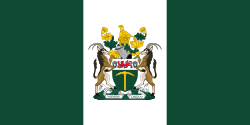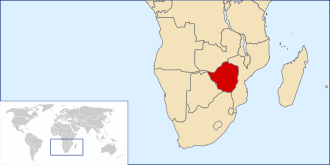Rhodesia
unrecognised state in Southern Africa (1965–1979) From Wikipedia, the free encyclopedia
Remove ads
Rhodesia (/roʊˈdiːʒə/, /roʊˈdiːʃə/),[1] officially from 1970 the Republic of Rhodesia,[2] was a republic in Southern Africa during the Cold War. It was the region that is now called Zimbabwe. The country replaced the British colony of Southern Rhodesia.
Remove ads
Nomenclature
The official name of the country under British law was "Southern Rhodesia", but the government in Salisbury used the name "Rhodesia" instead. This situation dated back to October 1964, when the colony of Northern Rhodesia changed its name to Zambia following independence, so the colonial government felt that "Southern" Rhodesia should no longer be used because there was no "Northern" Rhodesia. However, Britain believed that only their government could change the colony's name and not the colony itself.
Remove ads
History
Unilateral Declaration of Independence (UDI)
The British government adopted a policy called no independence before majority rule, which dictated that colonies with a certain amount of white settlers would not become independent until they adopted a policy of majority rule. This had conflicted with the beliefs of the white minority Rhodesian Front, lead by Ian Smith, which believed that Rhodesia should become an independent country anyway. This continued until relations between the colony and the British government broke down in 1965.
On 11 November 1965, Smith's government issued a unilateral declaration of independence (UDI) from the United Kingdom. Many countries condemned the UDI and the United Nations Security Council placed sanctions on Rhodesia.
Rhodesia sought international recognition as a Commonwealth realm, with Queen Elizabeth II as "Queen of Rhodesia", but later severed it links to the British Crown by becoming a republic on 2 March 1970.
Remove ads
The Bush War
As early as 1960, many native African nationalists began to challenge Rhodesia's minority rule policies. In 1964, tensions boiled over and the Rhodesian Bush War began. On one side, the minority rule government, led by Ian Smith, hoped to keep the whites in power. On the other side, the ZANU-PF, led by Robert Mugabe, fought for majority rule. After about 15 years of fighting, the Lancaster House Agreement was signed which allowed majority rule. This led to Zimbabwe's independence.
References
Wikiwand - on
Seamless Wikipedia browsing. On steroids.
Remove ads




